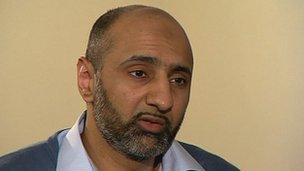Abu Hamza and Babar Ahmad extradition approved
- Published

Babar Ahmad, 37, has been held in UK custody without trial for nearly eight years
The European Court of Human Rights has given its final approval for the extradition of five major terrorism suspects from the UK to the US.
The court's highest judges said they would not re-open the cases of Abu Hamza al-Masri, Babar Ahmad and others.
The decision means that the extradition of the men, wanted for years by the US, is likely to happen within weeks.
The Home Office welcomed the decision, saying it would ensure the extraditions happened as quickly as possible.
The men had argued they would face inhumane treatment in the United States if they were sent there.
Abu Hamza is accused of planning a terror training camp in the US and assisting hostage-taking in Yemen.
The US says that Mr Ahmad and his co-accused, Syed Talha Ahsan, ran a jihadist website in London that provided material support for terrorism.
Adel Abdul Bary and Khaled al-Fawwaz are accused of being aides to Osama bin Laden in London.
In a statement, the Strasbourg court said: "On 10 April 2012 the European Court of Human Rights held, in the case of Babar Ahmad and Others v. the United Kingdom, that there would be no violation of the applicants' rights if extradited to stand trial in the United States.
"On 9/10 July 2012, five of the applicants lodged a request for referral of the case to the Grand Chamber. Today the Grand Chamber Panel decided to reject the request. This means that the Chamber judgment of 10 April 2012 is now final."
Abu Hamza had alleged that he faced inhumane and degrading treatment if imprisoned for life without possibility of parole.
The other four men said that they faced an inhumane regime of solitary confinement in a special "supermax" prison.
A Home Office spokesman said: "The Home Secretary welcomes today's decision not to refer the cases of Abu Hamza and four others to the Grand Chamber. This follows the judgment of the European Court of Human Rights on April 10 to allow the extradition of these five terrorism suspects to the US.
"We will work to ensure that the individuals are handed over to the US authorities as quickly as possible."
Labour MP Keith Vaz, who chairs the Home Affairs Select Committee, welcomed the decision: "I think we've been waiting a very long time for Abu Hamza to be extradited."
"He went to the European Court and he tried to delay matters but now the decision has been taken so this clears the way for the Home Office to take action as quickly as possible against him and Adel Bary and Khaled Fawwaz - because they have all got histories of involvement in terrorism."
But Mr Vaz said there was "a concern" about Babar Ahmed and Talha Ahsan because "their family and the campaigners supporting their case point to the fact that there is a problem as far as the evidence is concerned - evidence that was handed straight over from the police to the American authorities - and they've asked the DPP [Director of Public Prosecutions] to reconsider matters.
"Indeed I, as chairman of the committee, have written following the request that they made to us."
The five cases go back many years: Abu Hamza and Mr Ahmad have been in custody since 2004, and Mr Ahsan since 2006; the arrests of Mr Bary and Mr al-Fawwaz date back to 1998, making them the longest-held detainees without trial in the UK.
Abu Hamza was convicted in 2006 of charges including soliciting to murder and stirring up racial hatred, and given a seven-year jail sentence.
Following the European ruling on Monday, US Justice Department spokesman Dean Boyd said: "We are pleased that the litigation before the European Court of Human Rights in these cases has come to an end, and we will be working with the UK authorities on the arrangements to bring these subjects to the United States for prosecution."
Mr Ahmad's family said: "The decision of the Grand Chamber is largely irrelevant to us as this matter should never have come to this stage had the British police done their job almost nine years ago and provided the material seized from Babar's home to the CPS (Crown Prosecution Service), rather than secretly passing it to their US counterparts."
Fahad Ansari: "The fight will never be over until Babar (Ahmad) is back home with his family"
They said the CPS had all the information that was the basis for the US accusations and Mr Ahmad should immediately be prosecuted in the UK for conduct allegedly committed in the country.
"Moreover, a British businessman Karl Watkins has recently commenced his own private prosecution of Babar based on the principle of the matter.
"We now call on the home secretary to immediately undertake to halt any extradition until the Director of Public Prosecutions makes a decision on this material that been in his possession for several months."
- Published10 April 2012
- Published5 April 2012
- Published5 October 2012
- Published24 September 2012
- Published24 February 2012
- Published6 September 2012
- Published10 April 2012